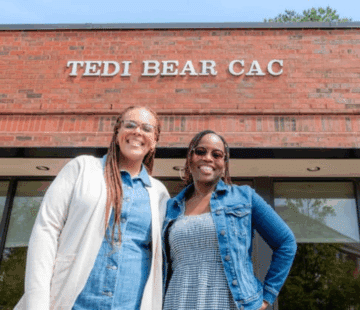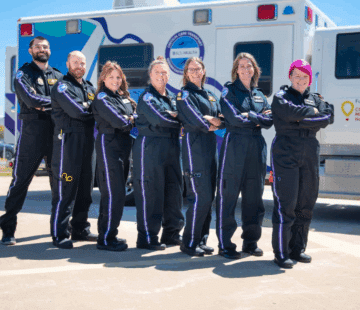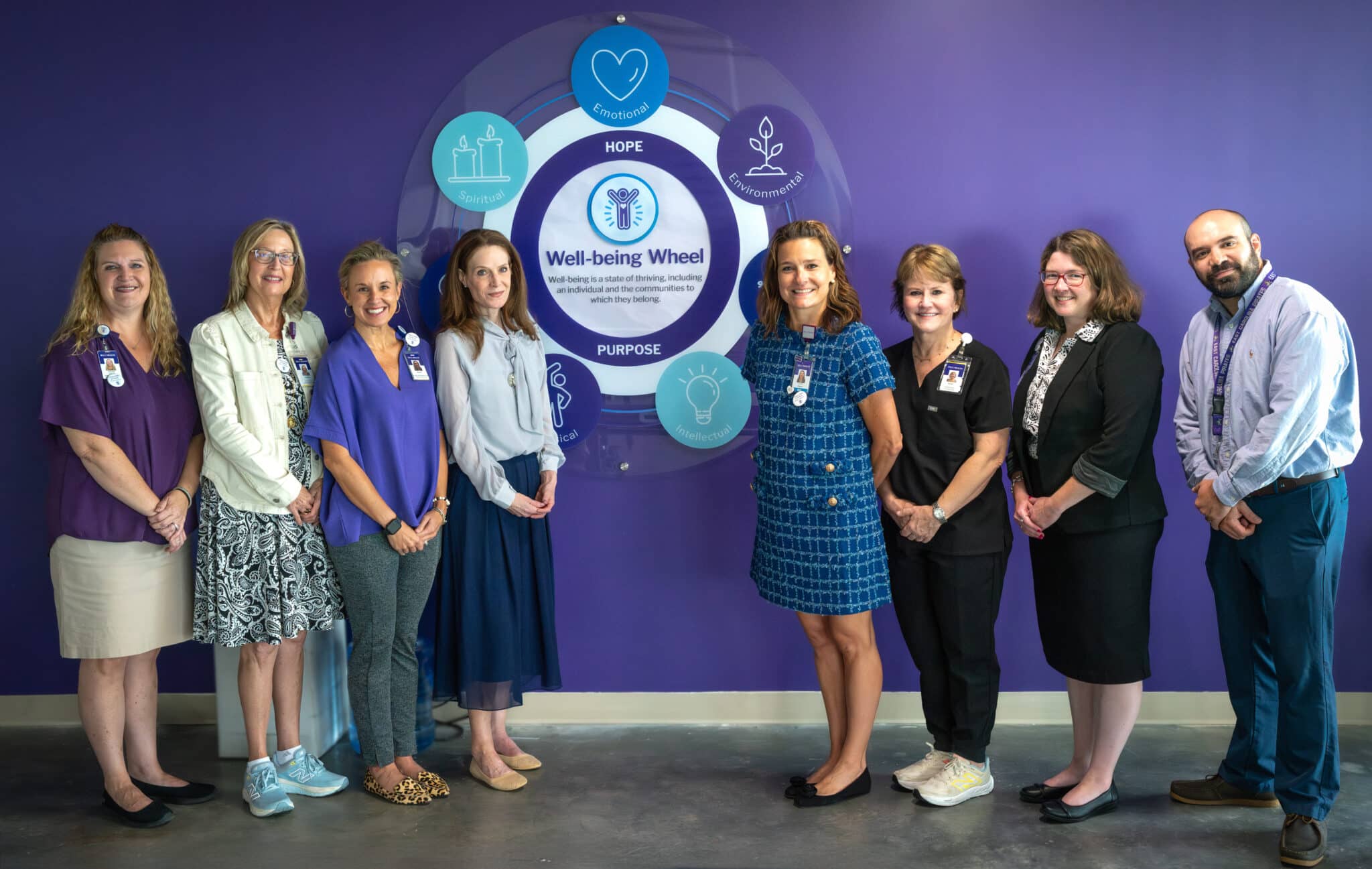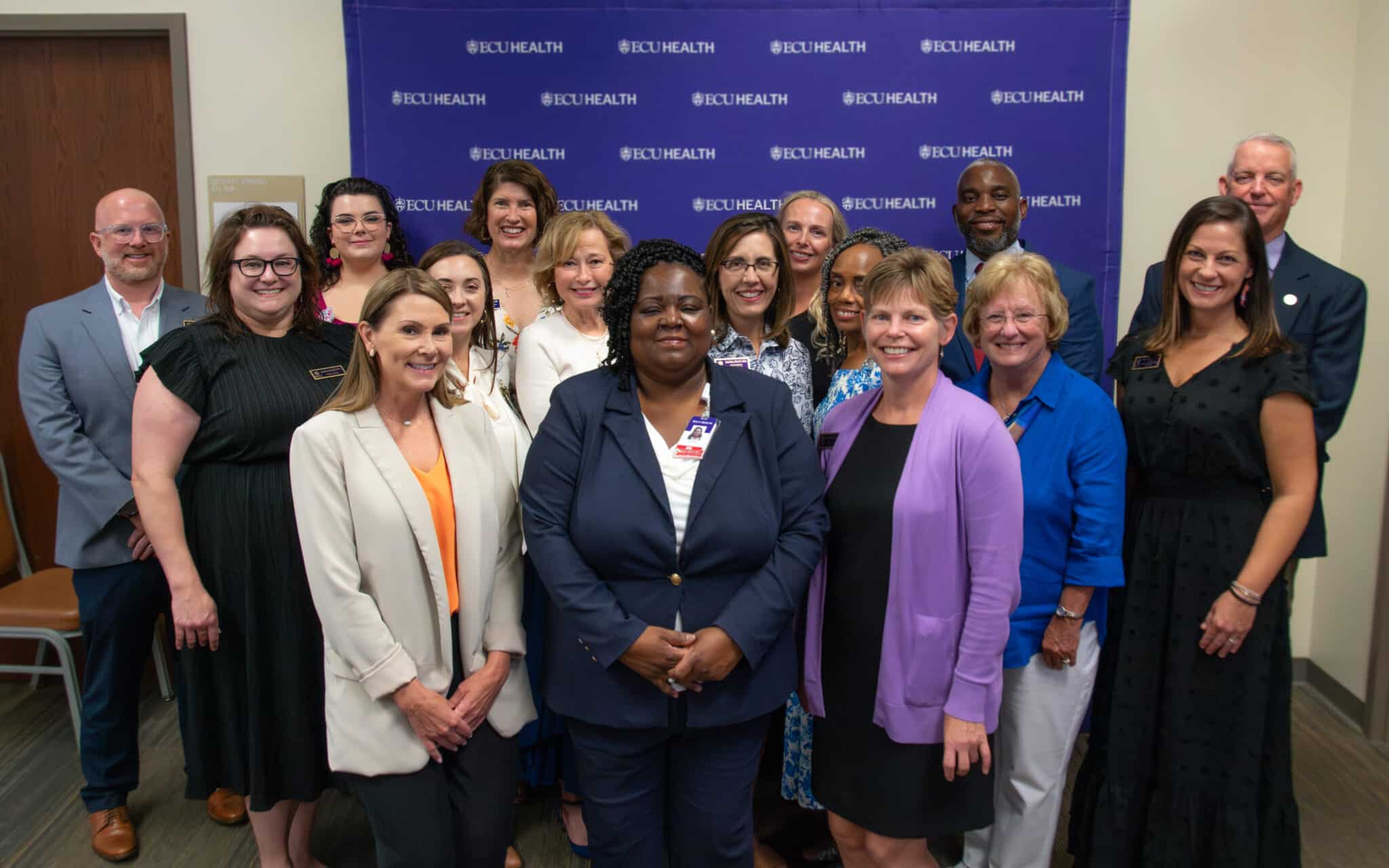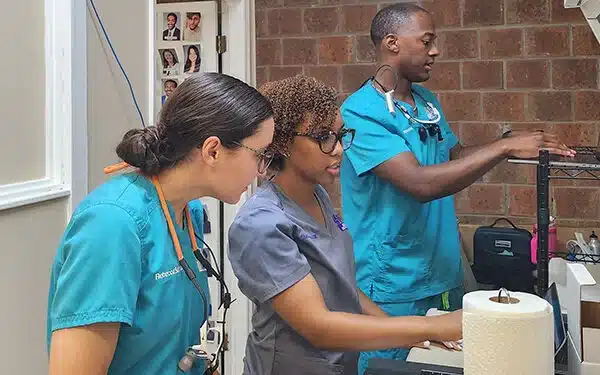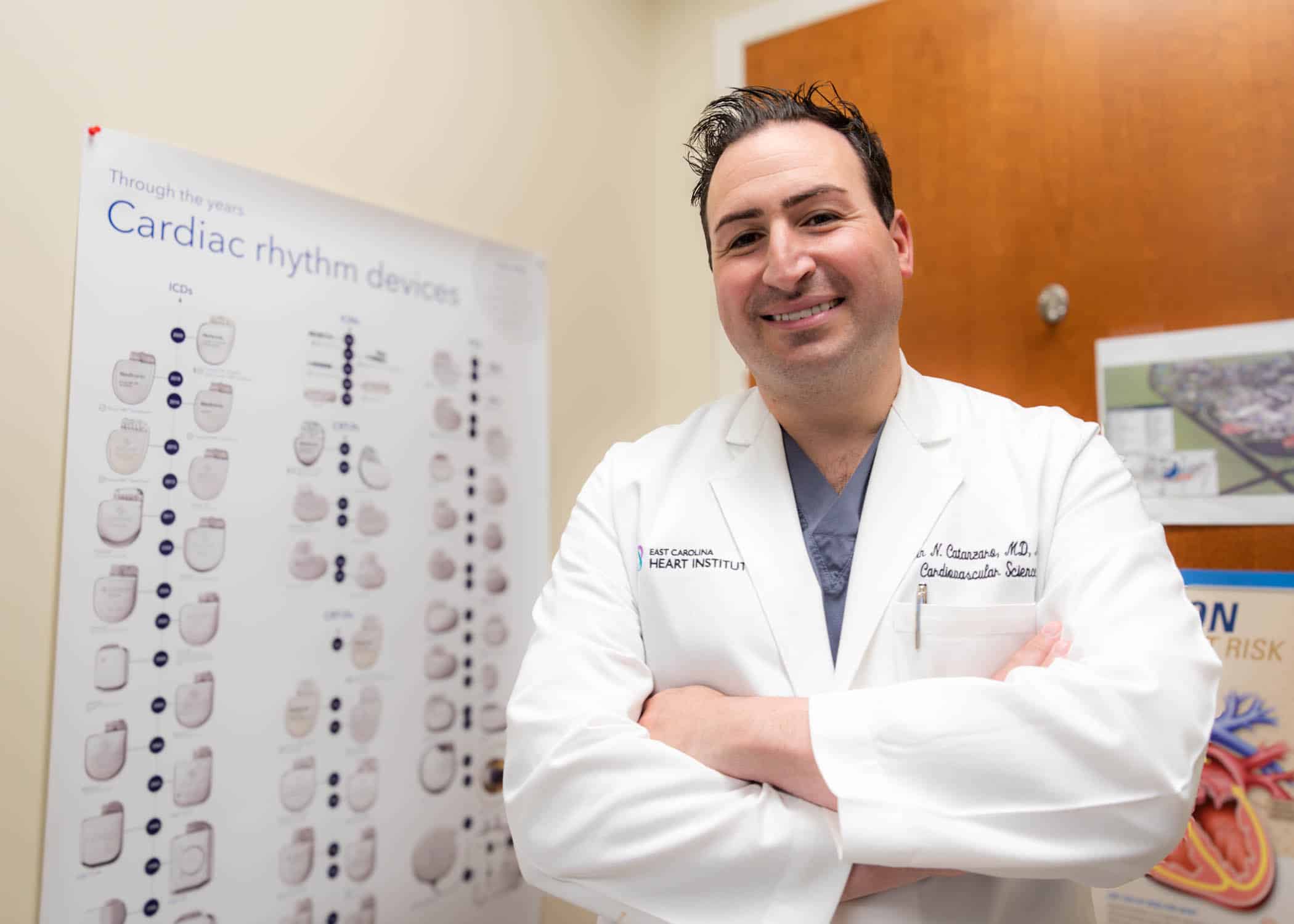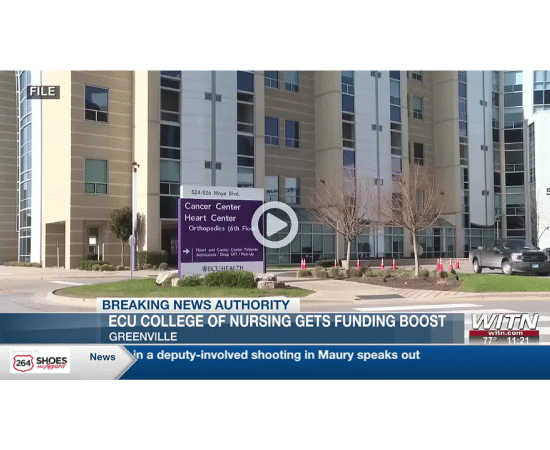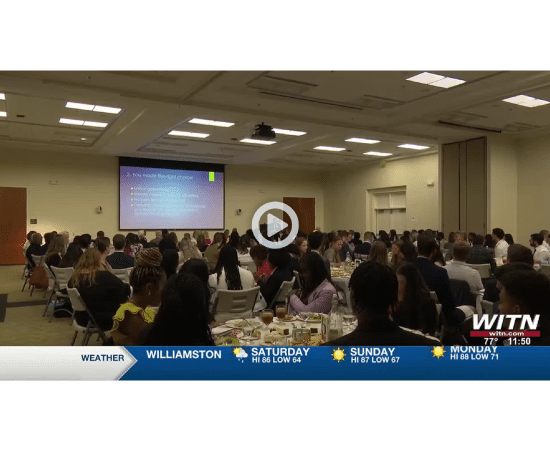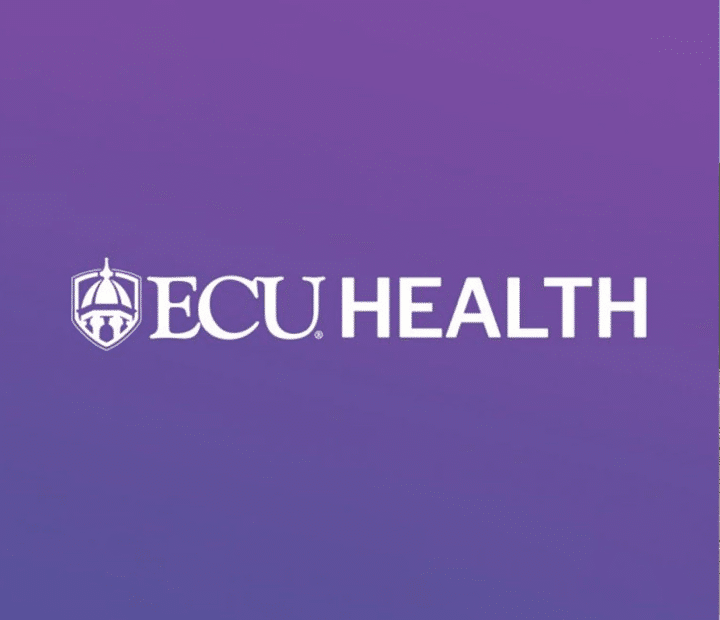Days after Hurricane Helene delivered devastation to western North Carolina, Dr. Jonathan Austin answered a phone call — and made good on a promise he made years earlier to serve his community and state.
Austin — a Lincolnton native and 2016 graduate of the East Carolina University School of Dental Medicine — loaded his Piper Arrow plane with much-needed supplies and took off for some of the most hard-hit areas after the storm. Austin’s plane skimmed the clear air above the stricken region, through mist and clouds that soon revealed rivers, lakes and streams swollen beyond their banks. He saw the unrecognizable wreckage of towns and communities and smears of red clay chewed from the mountains by mudslides. But when the wheels of the plane touched down at small regional airports, Austin was met with open hearts and hands, grateful and compassionate people ready to help their communities rebuild.
During his numerous trips delivering supplies, Austin observed the beauty and breaking point of nature — but he also witnessed the strength and spirit of humanity. When he received a phone call imploring him to help deliver post-storm supplies to the damaged region, Austin, who practices at Austin Dentistry in Lincolnton, didn’t hesitate. He first flew into the Jackson County Airport near Sylva on the evening of Sept. 29 and made several more trips during the days following the hurricane, carrying in-demand items from food and distilled water to diapers, insulin and manual breast-milk pumps.
Austin balanced those flights with continuing to provide oral health care to his patients — using his education and life experiences from dental school, the military and dental practice to touch the lives of people whose paths he crossed in the storm’s aftermath. “You know, everybody was kind of helping everybody, and everybody was asking about everybody,” Austin said of the supply flight experience. “There’s people that I think I will probably talk to for the rest of our lives.” Answering the call came naturally to Austin.
A 2004 graduate of West Lincoln High School, he attended Appalachian State University for a time before enlisting in the U.S. Marine Corps and serving two deployments in Iraq. He returned to Appalachian State and earned a bachelor’s degree in cell and molecular biology with a minor in chemistry. After earning his Doctor of Dental Medicine degree from ECU, he fulfilled a personal promise to return to practice in his hometown. “I had always known I wanted to return to my hometown to practice, which lines up with the mission of the dental school,” Austin said, referring to the school’s efforts to educate dentist leaders for North Carolina’s most rural and underserved communities.
Over the years, Austin has kept volunteerism high on his list of priorities, completing eight to 10 hours of service a week, on average. He volunteers with the North Carolina Missions of Mercy, Baptist Dental Bus and Give Kids a Smile. He is a member of the American Dental Association, North Carolina Dental Society, Academy of General Dentistry and the Denver/Lake Norman Rotary Club. He also flew search and rescue during a several-year stint with the Civil Air Patrol. “I was always sort of programmed for this,” Austin said.
“I had always known I wanted to return to my hometown to practice, which lines up with the mission of the dental school,” Austin said, referring to the school’s efforts to educate dentist leaders for North Carolina’s most rural and underserved communities.
Over the years, Austin has kept volunteerism high on his list of priorities, completing eight to 10 hours of service a week, on average. He volunteers with the North Carolina Missions of Mercy, Baptist Dental Bus and Give Kids a Smile. He is a member of the American Dental Association, North Carolina Dental Society, Academy of General Dentistry and the Denver/Lake Norman Rotary Club. He also flew search and rescue during a several-year stint with the Civil Air Patrol. “I was always sort of programmed for this,” Austin said. When it came to coordination and communication, Austin had to wing it.
His first few flights were shrouded in fog and mist, the airport runways closed because of flooding. When the clouds cleared, though, Austin was able to see the true nature of Hurricane Helene’s destruction. He saw a mobile home park compacted into a mountainside; he could make out cars tossed aside like toys. Mud caked broken asphalt and pooled in the lower points, drying and cracking in the sun. “It was just debris,” he said. “It looked like somebody had just flooded everything. It was pretty crazy. The area was just devastated, seeing it from that view.”
For this crisis response, Austin and those helping load supplies on his plane had to ensure balance and weight measurements were precise, being careful not to overload the plane and dividing the supplies into multiple trips. He flew into counties including Jackson and Ashe, flying only briefly over Asheville, one of the hardest hit cities. For the first few days, the airports didn’t even have power, much less assurance that someone would be there to guide the plane in and unload supplies. “We were just worried if there was going to be anybody in the airport, and we hadn’t heard any reports out of it,” he said. “We had to land on the taxiway first, because the runway was flooded.”
But as word spread through the affected communities, volunteers showed up in droves to help unload the supplies and deploy them where needed. Austin said the experience was an opportunity for him to respond with his resources, skills and desire to serve, companied with his overseas deployments. “I’ve seen some things, if that makes sense. It’s similar to when I was overseas to a certain extent,” he said. “You’re sort of programmed for this kind of response and this kind of service to other people.”
Austin said he and many of his dental school classmates stay in touch, from bonding activities like hunting and fishing to working in tandem to benefit their communities. “We’re not afraid to get our hands dirty,” he said. “Several of us in our class knew we would return to our hometowns to practice dentistry and help our communities. With this, I just tried to do what needed to be done.”
Healthy snacks, well-being resources, a mindful walking trail and more were all on display at ECU Health Medical Center’s new Resident Well-Being Zone as part of a recent pop-up event hosted by ECU Health’s Well-Being team.
Resident physicians from across the Medical Center were invited to the pop-up event as a way of showcasing the new space, intentionally designed to support their well-being as they continue in their journey in medical education.
The pop-up event, according to Dr. Christina Bowen, ECU Health’s chief well-being officer, is an important way of ensuring residents are aware of the resources available to them at ECU Health.
“We are thrilled to have a resident well-being zone and to be able to offer something unique and purposeful to our resident physicians, who play such an important role here at ECU Health Medical Center,” said Dr. Christina Bowen, Chief Well-being officer at ECU Health. “The pop-up events are a fun way to get our resident physicians engaged in well-being and mindfulness which we know will benefit them during their time here at ECU Health. Our team is excited to be able to host well-being events throughout the year.”
Located on the sixth floor of the Eddie and Jo Allison Smith Cancer Center at ECU Health Medical Center, the Resident Well-Being Zone officially opened in August after years of thoughtful design and funding provided by the ECU Health Foundation. The space is filled with all the essentials a resident may need: exercise equipment, charting space, healthy snacks, coffee, even a ping-pong table and more.
Dr. Cole Carter, a fourth-year physical medicine and rehabilitation resident, said the pop-up event and the space itself have proven to be a welcome asset in the resident experience at ECU Health.
“I think it’s great,” Dr. Carter said, noting that his favorite part of the space is the ping-pong table. “It’s a great place to check out when you need a break from the busy schedule. You can get a great view of Greenville and just take time to relax. I try to come up here once a month or so. This is a great asset for our residents and for those who may be looking for a residency program.”
Dr. Mary Catherine Turner, interim associate dean of Graduate Medical Education, understands first-hand the value of a Resident Well-Being Zone. She said she was fortunate to have one during her time as a resident physician, and it helped her take a break, refresh her mind and get re-engaged in the mission-driven work of providing high-quality health care. Now, she is excited that current and future resident physicians get to experience a similar benefit as they care for patients and continue to learn at one of the busiest academic medical centers in the nation.
“A space like this is important for residents,” Dr. Turner said. “Residents need a place where they can go and disconnect from their work for a little bit and reconnect with themselves. And importantly this is a place where residents can congregate together. I think there’s a lot that can be said for building a community, and this allows them the space to do that.”
On Aug. 28, East Carolina University College of Nursing and ECU Health gathered to celebrate their academic-practice partnership. Topics of discussion included entry-level and graduate-level education and practice, nursing research, and their vision for the future.
Chief Nursing Executive of ECU Health, Dr. Trish Baise, appreciates all the work that has been done by the collective nursing leadership team over the last few months. “We have built a strong foundation and are already realizing outcomes. This is just the beginning. Both our institutions are committed to finding innovative partnership opportunities that support the needs of our region and a better future for eastern North Carolina.” Baise said.
Dr. Bimbola F. Akintade, dean and professor at ECU College of Nursing, reflected on the past and mentioned that both institutions have come a long way.
“One of our advantages is not just the proximity but the overarching institutional dynamic we share can only serve as resources. Our vision is that both institutions are so intertwined that students who are graduating from ECU will also see an opportunity to work at ECU Health,” Akintade said.
Graduate-level education programs such as the Adult-Gerontology Clinical Nurse Specialist and the Neonatal Clinical Nurse Specialist concentrations are advancing nursing practice to provide better care for eastern North Carolina. The Clinical Nurse Specialist (CNS) program is unique and the only one in North Carolina. In addition to graduate-level programs, ECU and ECU Health have collaborated to sponsor a nurse extern program. This immersive program, allows students to gain practical experience in various care settings across the health system before their final semesters of nursing school.
During the celebration, a recent graduate of the nurse extern program expressed her gratitude. “I have never been more sure that I am where I’m supposed to be as a nurse and here at ECU Health,” she said. Kiley Fisher will be joining ECU Health Medical Center in February 2025.
Both institutions are hopeful for the future and what is to come.
When Connie Burleson moved from Sanford, North Carolina, to Swan Quarter in coastal Hyde County, one of her favorite pastimes became driving the back roads and taking in the area’s natural beauty. She navigates the Lake Mattamuskeet and Pamlico Sound wetlands and refuges saturated with birdlife. She passes farmland dotted with soil furrows, both fruitful and fallow. “That’s my joy,” Burleson said, “riding around and seeing things. I’ve been here three years, and there is still always something I haven’t seen.”One thing she and her neighbors in Hyde and surrounding counties can count on is that they, too, are being seen.
For the past two years, the School of Dental Medicine at East Carolina University has operated the Hyde County Outreach Clinic in the back of the Swan Quarter post office building. Students, residents, faculty and staff travel once a month from Greenville to care for patients in a county that currently has no practicing dentists. Burleson has sought care at the office since day one, getting a cleaning and routine follow-up care over the years. “It’s so nice having this so close to home,” she said, “and it’s awesome working with the students because you’re able to help with their education. All of this is helping Hyde County so much, too.”
The ECU dental school also has programs in place in Bertie and Jones counties to address oral health care in schoolchildren, creating a virtual triangle of care that encapsulates rural populations in critical need of dental care and services. These three county-based programs are making strides in reaching patients of all ages in some of North Carolina’s most underserved communities. “Our county-based programs are a testament to the dedication of our faculty, staff, students and residents to reach patients in rural areas where care is needed most,” said Dr. Greg Chadwick, dean of the ECU School of Dental Medicine. “The enthusiasm of our community partners and our patient bases also speaks volumes, validating that what we are doing is not only working, but also serves as a vital part of our school’s mission.” Just over two years ago, a ribbon was cut and a promise was kept.
Today, the Hyde County Outreach Clinic is bustling with patients and providers. Neighbors chat with neighbors while they await their appointments — “How’s the farming?” “How’s the family?” — and seasoned dentists introduce students and residents to the challenges and rewards of rural dentistry.
In 2019, the Anonymous Trust — a philanthropic group that aims to support rural and underserved communities — provided the School of Dental Medicine a grant award of $144,000 for portable dental equipment and personnel to launch the Hyde County Outreach Clinic.
In December 2022, the Hearst Foundations — national philanthropic resources for organizations working in the fields of culture, education, health and social services — approved funding in the amount of $100,000 for the school to provide dental care to underserved, uninsured and low-income rural patients. Portable dental equipment and special patient care funds will allow the school to provide high-quality dental care to North Carolina’s most medically underserved communities, beginning with the Hyde County clinic.
On a Friday in early August, the clinic’s internet was spotty. Without a secure connection, records and images couldn’t be accessed, and the day couldn’t begin. But where there is a problem and a group of dentists, there’s always a solution; usually, it’s an out-of-the-ordinary idea that withstands trial and error. Today is no different.
“That’s how it is, doing dental care in a rural community,” said Dr. Rob Tempel, the school’s associate dean for extramural clinical practices, as he and other providers finally made the vital internet connection. “It’s great for these students to have this kind of experience solving problems.” The experience students gain, he added, shows the level of dedication they have to serving their state now and as they graduate and embark on careers in dentistry. “It’s incredibly fulfilling to know that the students who are selected to attend this school continue to demonstrate and grow their passion to serve rural communities,” Tempel said. “Their positive energy continually refreshes us as faculty to see them genuinely want to do it.” Those fourth-year students are a part of something so much bigger.
Once a month on a Friday, the clinic provides care for anywhere from 15 to 25 patients. Since the clinic’s creation, close to 170 unique patients have undergone cleanings and procedures, keeping them close to home and bypassing the sacrifice of time and gasoline traveling to Greenville or dental offices in other counties. More than 120 dental students have traveled to Swan Quarter to provide care. The office has become part of Hyde County’s primary care team, bridging dentistry with overall health services, a key part of the School of Dental Medicine’s mission.
Fourth-year student Sydney Lewis said the opportunity to serve Hyde County comes during a rotation in the Ross Hall Service Learning Center on campus. “I have been anticipating being able to go to the Hyde County clinic since it was first started,” said Lewis. “I did a simple procedure on one patient that seemed small to me, but this patient told my faculty that their provider ‘must be a magician’ because their denture had not fit great in a while, but now it did. This made me so happy, and I will probably remember that forever.” Experiences like Lewis’s help solidify trust between patient and provider.
“Engaging with the local community helps students understand the importance of building trust and rapport with patients,” said fourth-year student Markus Mosley. “This relationship is crucial in rural settings where health care providers are often integral parts of the community. Participating in community-oriented service-learning projects helps students recognize the broader social determinants of health and the importance of public health initiatives.”
To Luana Gibbs, director of the Hyde County Health Department, the clinic is a partnership that also represents combining state and local resources for the good of the residents. “Vision, desire, support, collaboration and determination have been key,” she said. “First, there had to be the vision and desire to even attempt this type of service model, and I must give props to ECU for that. Multiple people with a passion to help our community have come together and succeeded in this partnership.” That collaboration includes ECU undergraduate students as well. Honors College student and public health major Aaron Mulkey has had the opportunity to observe procedures at the Hyde County clinic, shadowing providers and cementing his aspirations of dental school. “I love the hands-on approach to helping the community,” he said. “The commitment of the ECU dental school sparks passion in my mind.”
Fellow Honors College student and aspiring dentist Melony Grace Hodges serves as coordinator of the Hyde County clinic, gaining valuable insight on the business side of a dental practice. Many of the patients already know Hodges — she grew up a stone’s throw from the clinic and is vocal about her plans to return to her roots and provide oral health care to the community that raised her.
Burleson paused in the waiting area after her appointment and watched as Hodges checked other patients in and handled bills and phone calls. “I don’t know her very well,” Burleson said, “but I sure am proud of her. The dental school’s School-Based Oral Health Prevention Programs also ensure that similar homegrown smiles start out early in life.
Launched in Bertie County in 2019 through a $400,000 grant from the Duke Endowment and in Jones County in 2023, the program places ECU hygienists in select schools to provide oral health care and preventive education to children. The program offers comprehensive dental exams, X-rays, cleanings, fluoride varnish application and dental sealants to all public elementary and middle school children.
The Jones County program is jointly funded by the BlueCross BlueShield of North Carolina Foundation and the Duke Endowment; in addition to planning funding, the school received a $400,000 implementation grant in late 2022. For the past two years, the Delta Dental Foundation has provided a grant to offset the cost of care for uninsured children. The Bertie program is now self-sustaining through insurance, while Jones county’s is still grant-funded. Costs are also significantly reduced by the use of teledentistry, through which hygienists in the schools can connect with dentists on campus to discuss and diagnose cases.
“Seeing the students get more confident in their smiles and actually getting problems addressed is really rewarding for all of us,” said Rachel Stewart, dental hygienist and supervisor of the School-Based Oral Health Prevention Programs. Over time, Stewart has seen children become less apprehensive about receiving dental care, making it easier for parents to seek additional care in dental offices close to home. “Some of them do already have a lot of dental conditions and things going on, but we’re able to provide care in an environment where they’re already comfortable,” she said. “I think it lessens the anxiety, and now 99% of the time they’re excited.”
To date, more than 1,300 children have been served across Jones and Bertie counties, according to Stewart, including nearly 6,000 appointments during which more than 16,000 procedures were completed. Of the children served, 76% are on Medicaid — easing the challenges of patients connecting with Medicaid providers in rural counties — while 20% are uninsured and 4% have the cost of care covered privately. Most children enrolled in the programs are between 4 and 12 years old and range from kindergarten to 12th grade.
“The impact on the kids continuously grows as we are building relationships with the children, the schools, parents and community,” said Gina Hamilton, one of the school’s public health dental hygienists who cares for patients in Bertie County schools. “We are building trust and helping the children develop healthy habits.” The School-Based Oral Health Prevention Programs are also led by dental school faculty member and principal investigator Dr. Wanda Wright, along with faculty members Drs. Michael Webb and Vanessa Pardi.
“Most dental diseases are preventable, but many children unnecessarily suffer from dental disease because of lack of access to dental services and inadequate home care,” Wright said. “Poor oral health can have a detrimental effect on children’s performance at school and on their quality of life. Ensuring that students have preventive oral health services in school is important in helping them stay healthy and ready to learn.” Educational leaders in Bertie and Jones counties are also celebrating the strengthening collaborations. “This partnership is totally aligned with the district’s strategic plan as we try to ensure that our students have increased academic, social and emotional outcomes,” said Dr. Otis Smallwood, superintendent of Bertie County Schools. “Research tells us that poor oral health in students could lead to decreased academic outcomes, so we are very fortunate and proud of this partnership with ECU School of Dental Medicine.”
Pardi said the programs’ benefits extend to unique clinical experiences for students and exposure to potential careers for schoolchildren. The multi-dimensional benefits of the dental school’s county-based programs not only meet the school’s mission but stand to change the lives of all those involved — from patients young and old to dental students themselves. “Having grown up in a rural county, I’ve always felt a deep connection to these communities and knew that I wanted to give back by practicing in a similar setting, or ideally, in my hometown,” said fourth-year dental student Rebecca Sutton. “The Hyde County clinic provided me with my first experience providing care in a rural area, which was profoundly rewarding and solidified my passion for serving the place that shaped me.”
Trinity suffered abdominal injuries after being in a car accident with her mom. But Trinity had many people — and a dog — help her recover.
Dr. John Catanzaro, professor and chief of the Division of Cardiology at the Brody School of Medicine at East Carolina University and director of the East Carolina Heart Institute at ECU Health Medical Center, was recently honored with the prestigious Dr. John “Jack” Rose Distinguished Professorship, recognizing his significant contributions to improving health care delivery, excellence in clinical medicine, administration and academic advancement, including formation of the first Clinical Cardiac Electrophysiology Fellowship at ECU Health.
The Rose Professorship, established by ECU Health and East Carolina University through the ECU Health Foundation and state funds, honors Dr. Rose, a renowned cardiologist and professor. This endowed title supports the director of the East Carolina Heart Institute recognizes Dr. Rose’s exceptional contributions to cardiology and medical humanitarian work. Dr. Rose, who joined ECU Health in 1982 and the Brody School of Medicine in 1990, is celebrated for his dedication to patient care, teaching, and community service. Recipients of this professorship are expected to embody his ideals and passion for teaching, inspiring future generations of medical professionals.
“It’s an honor to be named to the Rose Professorship,” said Dr. Catanzaro. “This title not only recognizes Dr. Jack Rose’s work and legacy, which is focused on humanitarianism and the humanistic qualities of medicine, but it also allows me to highlight and continue his remarkable contributions. As program director, I perform hands-on teaching with trainees during cardiac procedures as well as teach didactic sessions. My primary role is to train the next generation of electrophysiologists to increase access to the patients of eastern North Carolina while maintaining a high standard of excellence in administration and leadership. This professorship is an opportunity to advance Dr. Rose’s legacy of teaching, administration and leadership, ensuring that his impact endures in these areas.”
Dr. Catanzaro completed his Doctor of Medicine with distinction in research at SUNY Downstate Medical Center, followed by an internal medicine residency and cardiovascular disease fellowship at North Shore University Hospital and a clinical cardiac electrophysiology fellowship at The Johns Hopkins Hospital. He also holds an MBA from the University of Florida. He is a Fellow of the American College of Cardiology, Heart Rhythm Society European Heart Rhythm Society and European Society of Cardiology. Dr. Catanzaro is actively involved with the Heart Rhythm Society’s Atrial Fibrillation Stroke Prevention Task Force and serves as vice chair of their Quality Improvement Committee. Nationally recognized for his work, Dr. Catanzaro has delivered invited presentations and chaired panels in the U.S., France, Italy, Germany, England, Romania and more. He also performed recorded procedures for the Heart Rhythm Society Scientific Sessions.
Dr. Catanzaro wanted to transition to an administrative role to broaden his impact beyond individual patients to the entire region and the cardiology division.
“We thought he was the best person for the future of cardiology,” said Dr. Mark Iannettoni, W. Randolph Chitwood, Jr, MD, Distinguished Chair in Cardiovascular Sciences, Brody School of Medicine at ECU and chief, Cardiovascular Service Line at the East Carolina Heart Institute at ECU Health Medical Center. “Dr. Catanzaro possesses a highly entrepreneurial spirit, bringing significant innovation to ECU Health. He has developed new techniques and devices in electrophysiology, advancing our capabilities in device management and patient care.”
The Rose Professorship comes with an endowment, managed by the university, to support ongoing and future initiatives in medical education and innovation. The endowment provides approximately $64,000 annually to advance the cardiology division’s educational and innovative efforts, supporting activities such as purchasing educational equipment, facilitating attendance at conferences, and other educational pursuits.
“The professorship facilitates innovation within the field by providing the necessary funding for new initiatives, such as introducing new devices,” said Dr. Catanzaro. “The goal is to use a certain amount of the endowment each year to support these innovations and to produce more trained physicians for the region. This helps establish our institution as a center of excellence and makes our advancements known.”
Dr. Catanzaro utilized part of the endowment to establish a two-year Electrophysiology Fellowship, admitting one fellow per year, starting this year. Electrophysiologists treat heart rhythm disorders and heart failure with electric devices inserted into the heart. As part of the fellowship, doctors will learn about pacemakers, defibrillators, implantation, ablations, leadless pacemakers, and left atrial appendage closure devices.
“This was one of the fastest fellowships from concept to establishment that we’ve ever done, which just goes to show you how much drive Dr. Catanzaro has,” said Dr. Herb Garrison, former associate dean for ECU’s Brody School of Medicine Graduate Medical Education. “It typically takes two to three years to establish a new residency or fellowship, and we did this in less than a year. That was a record time. And part of that had to do with Dr. Catanzaro and Alyson Riddick, who did an excellent job putting the application together.”
Dr. Jan Lopes is the first fellow in the Electrophysiology Fellowship at ECU Health. He learned about the new program through his cardiology fellowship leader in El Paso, Texas, and decided to join the fellowship because of Dr. Catanzaro’s strong vision for the program.
“Dr. Catanzaro’s enthusiasm for the program and education, along with the opportunity to shape the program for future fellows, attracted me to the fellowship,” said Dr. Lopes. “Despite being a new program, it feels well-established and highly developed. I feel incredibly supported in my role and am receiving top-tier training that rivals what is offered at major medical centers nationwide. We are utilizing cutting-edge technology and performing the latest procedures here at the medical center.”
Training doctors like Dr. Lopes with the latest technology and procedures is important for the future of health care. The need for well-trained electrophysiologists is increasing across the nation and here in eastern North Carolina, according to Dr. Garrison.
“The incidence of arrhythmias, along with the need for pacemakers and defibrillators, is rising as the population ages, making it a critical area of focus,” said Dr. Garrison. “Establishing residencies and fellowships serves two main purposes: recruiting top-tier faculty and creating a pipeline of skilled electrophysiologists. Faculty are attracted to institutions with trainees, and enhancing our program with excellent faculty was a strategic move by Dr. Catanzaro. This initiative ensures we have the necessary capability and qualified physicians to meet the growing demand for electrophysiology services.”
With the increasing demand for physicians and electrophysiologists trained to treat rural patients, Dr. Catanzaro’s efforts at ECU Health is paying off in the form of improved recruitment efforts.
“Dr. Catanzaro has successfully attracted numerous cardiologists,” said Dr. Iannettoni. “He has excelled at developing divisions within the cardiology department and navigating the integration of academia and medicine. His efforts have resulted in many of our graduates choosing to stay with us, which is a significant benefit of our program. We’re proud to retain our own trainees, ensuring continuity and excellence in our team.”
East Carolina University’s College of Nursing has received a significant investment of $3 million from the state of North Carolina to increase the number of entry-to-practice nurses who graduate from the college’s undergraduate program.
Of the nine UNC System schools that applied for, and received, funding increases to support their baccalaureate nursing programs, ECU received more than any other program, a signal of the state’s confidence in the College of Nursing’s capacity to graduate the most competent and practice-ready entry-to-practice nurses in the state.
“This is a huge investment in our program, and I think it will be a turning point in the history of Pirate nursing,” said Dr. Bim Akintade, dean of the College of Nursing.
In the current fiscal year, the college will receive $1,125,000 to expand the undergraduate program, with a further $1,875,000 projected to be transferred by May 2025.
In 2023, the college graduated 231 entry-to-practice nurses who achieved a 99.57% first-time pass rate on the National Council Licensure Examination (NCLEX), which nursing school graduates must take before becoming licensed to practice.
College leaders are working on details about the number of new students who will be admitted and the number of faculty needed to support that growth but acknowledge that more students will require more teachers.
“Our current faculty have proven they know how to prepare nursing students to become nurses,” Akintade said. “I have complete confidence that our team will use this funding to bring more world-class instructors into our classrooms and clinical spaces.”
“Our students learn an incredible amount in the classroom, but clinical rotations with a live patient and preceptors providing real-time feedback is where the student nurses learn how to be nurses,” said Dr. Shannon Powell, associate dean for academic affairs and an associate professor of nursing.
The college offers several education tracks for its graduates: a traditional undergraduate program, an accelerated BSN program for students who already have a bachelor’s degree, and a partnership with 17 eastern North Carolina community colleges to help registered nurses transition to their BSN degrees.
The need for nurses in North Carolina is great. Projections from the UNC Program on Health Workforce and Research show that by 2033, there will be a shortage of at least 12,500 registered nurses, overburdening an already overtaxed health care workforce, particularly in rural and underserved areas of the state.
In 2023, the College of Nursing signed an agreement with ECU Health to expand the number of nurses in North Carolina through an academic-practice partnership. More than two dozen student nurses recently graduated from a nurse extern program that placed them in clinical settings for eight weeks to gain skills and insights they will use once they graduate.
“Everyone understands that this is an all-hands-on-deck situation. We owe it to our families, friends and neighbors to make the most of this investment in the future of Pirate nursing,” Powell said.
East Carolina University’s Brody School of Medicine has been recognized as a tier-one medical school in the latest U.S. News & World Report rankings.
The school is one of only fifteen nationwide to receive this distinction for primary care practice and is the only medical school in North Carolina to achieve this status.
The recognition arrives as new students, such as Ryan Bonnett, prepare to start their medical education at Brody.
“The Brody School of Medicine has prepared doctors for decades who make a tangible impact in the community, and being part of that tradition is a big honor,” Bonnett said.
Brody School of Medicine was also highlighted for its emphasis on primary care in rural and federally designated health service shortage areas. The school consistently ranks highly for producing graduates who serve in these underserved communities.
ECU stated more than half of Brody’s graduates from 2015-2017 entered primary care residencies in specialties such as family medicine and pediatrics.
“More often than not, our graduates go into primary care and serve in communities that are in desperate need. We are incredibly proud of their commitment to service,” said Dr. Jason Higginson, Executive Dean of the Brody School of Medicine.
Students at the school’s annual Albernaz Golden Apple Distinguished Lecture expressed their enthusiasm for their forthcoming studies.
“I know that I’m in the right place and that this school is equipped in all areas to prepare me,” Bonnett said.
The U.S. News rankings considered various factors, including student selectivity and MCAT scores, and this year’s methodology introduced a tiered ranking system rather than an ordinal scale. Schools in tier one were deemed the highest-performing institutions.
Additionally, U.S. News released a separate report ranking medical schools based on research performance.
Thursday you can cool down, and give back to ECU Health’s Maynard Children’s Hospital, all while getting a sweet treat. It’s all a part of Dairy Queen’s annual Miracle Treat Day.
Every one dollar off a blizzard sold, will go back to help Maynard Children’s Hospital. Officials from ECU Health say in the past 20 years, Dairy Queen has raised nearly $200,000 for Maynard Children’s Hospital.
“We fund things from different types of equipment. So big transport trucks, down to little tiny vein finders for NICU babies, to supporting different programs at our children’s hospital like our child life program,” says Elise Ironmonger, Director of Programs for Children’s Miracle Network Hospitals at ECU Health Foundation.
Locations that are taking part include, Atlantic Beach, Emerald Isle, Greenville, Havelock, both Jacksonville locations, Morehead City, New Bern, Pine Knoll Shores, Roanoke Rapids, Sneads Ferry, Williamston and Winterville.
ECU is once again achieving high marks for their Nursing program with a re-accreditation.
According to ECU Health the Nurse Residency Program at ECU Health Medical Center recently achieved re-accreditation from the American Nurses Credentialing Center’s (ANCC) Commission on Accreditation Practice Transition Programs (PTAP) until July 2028. ANCC Practice Transition Accreditation validates hospital residency or fellowship programs that transition registered nurses (RNs) and advanced practice registered nurses (APRNs) into new practice settings which must meet rigorous, evidence-based standards for quality and excellence.
Trish Baise, DNP, RN, NEA-BC, FACHE, chief nursing executive, ECU Health says, “I am proud to recognize and celebrate the incredible contributions of our ECU Health nurses who exemplify the mission, vision and values of ECU Health through their exceptional care in our hospitals and clinics.The Nurse Residency Program at ECU Health Medical Center plays a crucial role in recruiting and retaining excellent nurses that are passionate about serving eastern North Carolina. I take pride in our ECU Health nursing community, and I am grateful to every nurse who chooses ECU Health as their professional home.”
ECU Health Medical Center accredited transition programs try and promote continued learning skills for Nurses to deliver safe, professional high-quality care.
Takisha Williams, DNP, RN, NPD-BC, nursing education specialist and director of the Nurse Residency Program at ECU Health Medical Center concludes saying, “ECU Health takes great pride in the Nurse Residency Program being acknowledged by ANCC as a premier transition program for nurses. Our program is grounded in evidence-based practices to foster exceptional nursing care. ANCC accreditation provides nurse residents and fellows with confidence in our program, ensuring a structured path to development, rigorous evaluation methods and measurable learner outcomes.”



